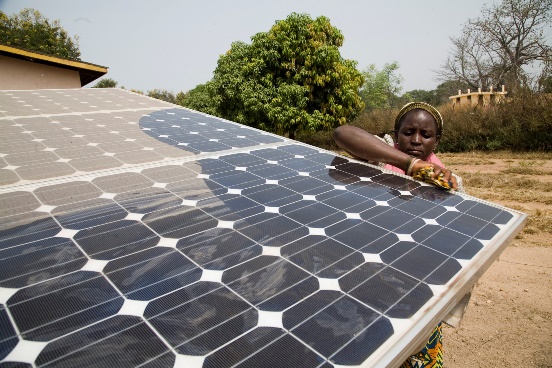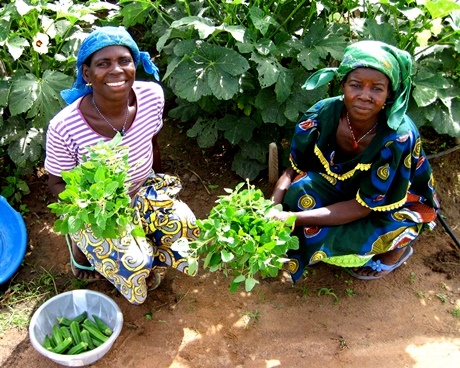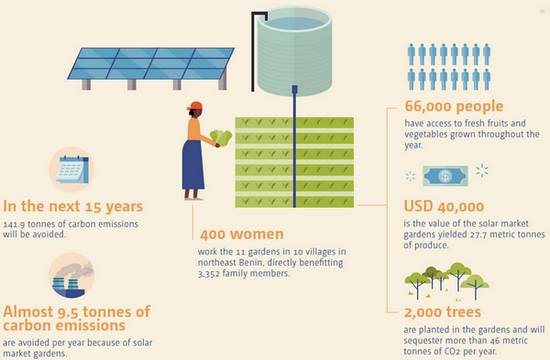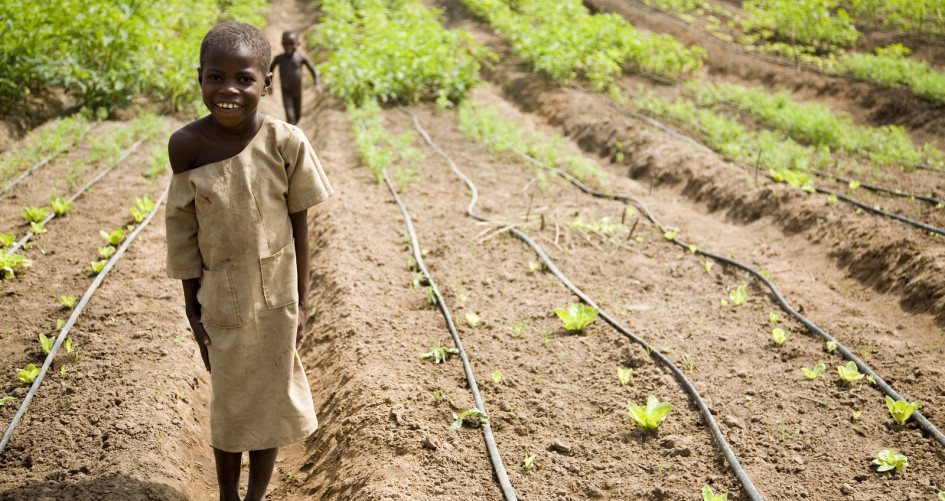In Benin, a six-month dry season makes it difficult for women farmers to grow food. But thanks to an innovative project developed by the Solar Electric Light Fund (SELF), a nonprofit that designs and delivers creative solar solutions to fight energy poverty, year-round food production is now possible in Benin’s remote villages. SELF’s Solar Market Garden project combines solar-powered pumps with drip irrigation systems to provide a cost-effective and environmentally friendly way to pump water for irrigation from nearby rivers and underground aquifers. The Solar Market Garden system provides reliable, year-round, production of high-value, nutritious produce, allowing girls and women to reallocate their time to educational and economic pursuits, rather than having to haul water long distances. It also empowers them to become entrepreneurs and leaders in their communities. By embracing solar power and micro-irrigation technologies, these female leaders are trailblazing solutions for both climate change mitigation and adaptation that can be replicated throughout the world, especially sub-Saharan Africa.

Key facts:
- 400 women work the 11 gardens in 10 villages in northeast Benin, directly benefitting 3,352 family members
- 66,000 people have access to fresh fruits and vegetables grown throughout the year
- In the 2013-2014 dry season, the solar market gardens yielded 27.7 metric tonnes of produce valued at USD 40,000
The problem
During the dry season in Benin’s northeast district of Kalalé, there is precious little rainfall, and the land is parched. Women farmers and their families were trapped for years in a cycle of poverty and poor health because the six-month dry season makes it nearly impossible to grow food.
The solution
The Solar Market Garden concept creates a safety net for the dry season, reducing environmental and health vulnerability, and providing a reliable base income for women farmers.
To date, there are 11 half-hectare-sized Solar Market Gardens, with 30-40 women working in each. Solar energy powers a well pump to water gardens through a drip irrigation system. One garden supplies two tonnes of produce monthly. Twenty percent is for home consumption; the balance is sold, generating a profit of USD 7.50 weekly for each woman vendor. That money helps pay for their children’s school fees and healthcare.
The initiative provides the women with tools for agricultural, technical, nutritional and marketing education. They have created an all-female board for the local organization that coordinates the women's farming collective activities. They have become community leaders and savvy entrepreneurs.

Helping the planet
The Solar Market Garden project has replaced diesel generators with solar pumps, avoiding a minimum of 0.86 tonnes of carbon emissions annually per garden, and provided a means for the most vulnerable in Sub-Saharan Africa to adapt to future water shortages resulting from climate change.
If similarly sized liquid-fuel pump sets (0.75–1.5 kW) replaced the solar-powered pumps, they would consume 0.15 litres of fuel per cubic meter of water pumped, generating a minimum of 0.86 tonnes of carbon emissions per year – 12.9 tonnes over a 15 year period. With 11 Solar Market Gardens in operation, that calculates to 9.46 tonnes of avoided carbon emissions per year – 141.9 tonnes of carbon emissions avoided over the next 15 years.
In addition to reducing greenhouse gas emissions, the Solar Market Garden model enhances the sequestration of these gases by allowing for the intercropping of several different tree species that were planted in the gardens. With a carbon sequestration rate of 22.7 kg of carbon per tree, per year, the 2,031 newly planted trees will sequester more than 46 metric tonnes per year.

Helping people
Residents are experiencing the transformative power that this simple and effective technology has had on their lives. Food security in the villages increased; each garden supplied nearly two tonnes of high-value fruits and vegetables per month. And because the communities had access to year-round food, their nutrition improved. The income of the 400 women farmers also increased by an extra USD 7.50 per week from the sale of fresh produce at a local market.
Where they formerly had little influence, the women of the 11 participating farming cooperatives have raised their status in the community and are regarded as successful farmers and entrepreneurs responsible for bringing fresh produce to local markets that serve more than 66,000 individuals.
The Solar Market Garden beneficiaries recently took the culturally radical step of electing a women-run, all beneficiary administrative board for ADESCA, SELF’s local NGO partner. Together, SELF and ADESCA, are devoted to working to optimize the gardens’ output and expand them to more of the 32 remaining villages in the district.
In rural Benin, women and girls traditionally are responsible for hauling water by hand, often from very long distances. The solar-powered irrigation systems were designed to free them from hauling water to grow vegetable crops, particularly during the dry season.

Spillover effect
Building on the success achieved by these pioneer women in Benin, SELF is working to refine the Solar Market Garden into a model that can be widely replicated and scaled throughout the world. By harnessing the power of the sun to water their crops like the women farmers in Benin have done, other women will now be able to lift themselves out of poverty and secure their future. With solar panels and pumps being more reliable and less expensive to run than liquid fuel alternatives, this technology is well suited to the poor who have limited resources and great need.
While the entire continent can benefit from drip irrigation, it is expanding most rapidly in sub-Saharan Africa, according to the Food and Agriculture Organization of the United Nations. Drip irrigation has resulted in yield gains of up to 100%, water savings of up to 80%, and associated fertilizer, pesticide, and labor savings over conventional irrigation systems. These statistics are good for food production
and water savings, but substituting diesel pumps with solar pumps offers additional benefits in terms of climate change and economics.




Images owned by the activity partners, all rights reserved

